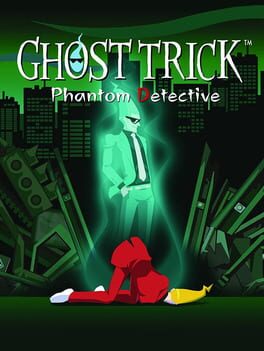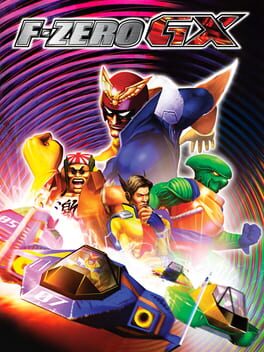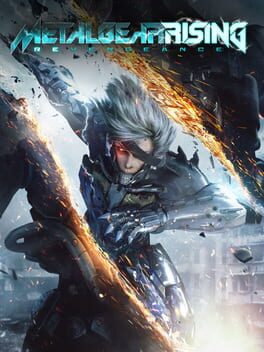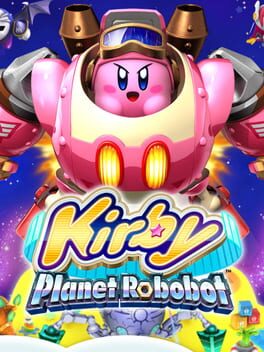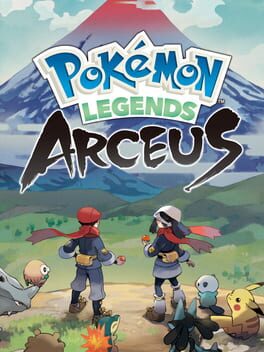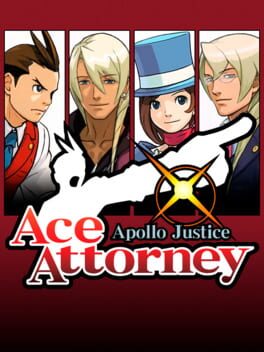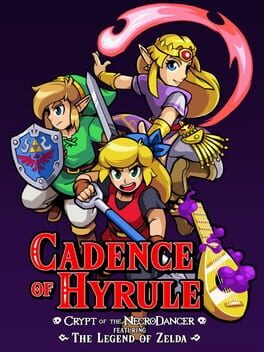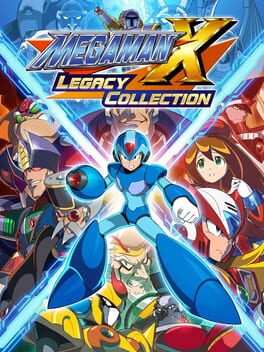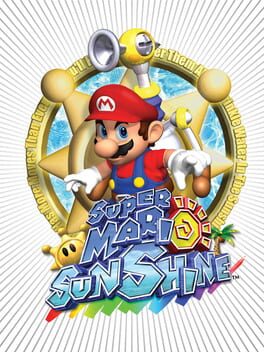Gotham
24 Reviews liked by Gotham
F-Zero GX
2003
A step in the right direction but clearly shows its ugliness as a poorly looking tech demo. Filling dex entries became TEDIOUS as hell and the battle system is straight up inferior to the main series.
The gameplay loop in this game was hypnotic for the first few areas. And when you got access to Basculegion, Sneasler, and Braviary, it felt great to find all of the new stuff in older areas. I remember the excitement I felt the first time I found the alpha Infernape on the island in the first area. But that excitement wanes incredibly quickly the more you progress. I soon wasn't getting the same rush after encountering a new species, alpha, or even shiny pokemon. My only goal left was to finish filling in the entries - and that sucks! It's boring as hell and made me drop the game after I beat Volo. I never even got to catch Arceus. The new battle system is not sustainable enough on its own to keep me playing. Pokemon Legends: Arceus lost its luster. Its replay value is way less prominent because team building is not nearly as important as in the main series games. It had high highs but I don't see myself coming back for a very long time. I am excited to see this formula be adapted for Scarlet and Violet, as I think they will fare much better. I said the same thing with Let's Go that I'll say here: there is no reason to remove abilities from the game. The only upside was that I used Rotom-Fan on my team without feeling guilty!
The gameplay loop in this game was hypnotic for the first few areas. And when you got access to Basculegion, Sneasler, and Braviary, it felt great to find all of the new stuff in older areas. I remember the excitement I felt the first time I found the alpha Infernape on the island in the first area. But that excitement wanes incredibly quickly the more you progress. I soon wasn't getting the same rush after encountering a new species, alpha, or even shiny pokemon. My only goal left was to finish filling in the entries - and that sucks! It's boring as hell and made me drop the game after I beat Volo. I never even got to catch Arceus. The new battle system is not sustainable enough on its own to keep me playing. Pokemon Legends: Arceus lost its luster. Its replay value is way less prominent because team building is not nearly as important as in the main series games. It had high highs but I don't see myself coming back for a very long time. I am excited to see this formula be adapted for Scarlet and Violet, as I think they will fare much better. I said the same thing with Let's Go that I'll say here: there is no reason to remove abilities from the game. The only upside was that I used Rotom-Fan on my team without feeling guilty!
This review contains spoilers
Apollo Justice: Ace Attorney is an origin story. It’s a prequel to a game that doesn’t exist. It’s divisive, and I think it’s very misunderstood, but I believe it’s my favorite AA game as of now.
A quick note before I get to the game: I played the 3DS remaster of Apollo Justice. This means I got remastered sprites, an option to play in 3D, and the glorious “Skip All Text” option. After coming fresh off of the Investigations games, the skip text option is a godsend. The text in the DS games scrolls unbearably slow, so to have the option to complete/skip any text box at any time was excellent. I also switched on the 3D effect occasionally, and it looked pretty nice – especially in the MASON system. I highly recommend playing this version of the game if you can.
Before discussing the chapters, I want to talk about this game’s biggest flaw in my opinion: the investigation sequences. Outside of the MASON system investigation in case 4, the investigations have essentially reverted to the quality of AA1. This means you can’t present profiles (yay!) and there are no psyche locks or rebuttals (aww!). Progression can be super obtuse, requiring the player to present a random piece of evidence before moving forward with the story. I played the investigations duology before this because they come first in the game’s timeline, but I know this game released first. So I can’t fault it for not having the fancy logic system, rebuttals, or birds-eye movement. But I absolutely can fault this game for not having at least some equivalent to psyche locks. And I do. I liked the forensics stuff that you do with Ema, but it’s such a small part of the experience.
I’m also going to address the new Perceive system here. I find it to be a net neutral effect on the gameplay. Finding the tics of witnesses wasn’t ever hard. I didn’t like the narrative implications of the magatama being a lie detector, and I guess I still don’t like the bracelet doing it here, but at least you always have to back up your claim with evidence…so it’s kinda just like a normal cross examination. It was never a huge deal for me, and I don’t find it to be an intrusive mechanic.
Oh, and the soundtrack is the best in the series. No contest.
Episode 1: Turnabout Trump
”I have a message for you. ‘The last hand is about to be played. You’ll need a trump card to make it…Use it wisely, and the game is yours.’ That is all.”
- Trucy Wright
This is the least controversial case in the game, as far as I can tell. It’s an amazing intro case that subverts your expectations in a very cool way. Phoenix returns in a very different state than we know him to be in. Your mentor, Kristoph Gavin, is the culprit and the murder mystery itself was also super fun to unravel. Not only was the bloody ace an interesting trump card to win the case, but it has a lot of interesting story implications down the line. I don’t have much more to say about this one…it leaves mysteries for the future while being a compelling case on its own. One of my favorites, for sure.
Episode 2: Turnabout Corner
”Some advice: Now’s a good time to review all you know…Everything you’ve learned over the last two days.”
- Klavier Gavin
Turnabout Corner is blatant filler but panty-snatching aside, I think the way this case continues to subvert player expectations and present itself is incredibly smart and underappreciated. Most of the big character introductions happen here. You meet Trucy, a deceptively perceptive little girl and daughter of Phoenix. During the trial, she convinces the courtroom that she’s being threatened at knifepoint in order to call a recess. She actively contributes to discussions in the courtroom and a lot of her actions suggest that she knows a lot more than she lets on. Perhaps one of my favorite dynamics is between Ema Skye and Apollo/Trucy. Ema has grown into a cynical detective who hates her job. While Gumshoe was super attached to Edgeworth, Ema hates this game’s prosecutor and most of the police force in general. She wanted to be in forensics, and sticks around hoping to repay her debts to Phoenix Wright. What I love about her is that her attitude brightens up so much when you work with her. While Gumshoe always had a sort of rivalry with Phoenix and resisted supplying info to him, Ema has no problem breaking the rules and letting Nick’s successors help out with her forensics work. It truly seems like Apollo and Trucy are her favorite part of her job and their interactions in this case and going forward are great. The prosecutor of this game is Klavier Gavin, Kristoph’s younger brother. He’s not here to get revenge, he’s just a nice guy. I think this is his weakest of the three cases he’s in, but he is still yet another tool that the game uses to subvert player expectations. The murder itself is cool, and the twist with the noodle stand at the end was fun. I like how the judge doesn’t give Alita Tiala any pretty girl privilege like he did for April May and Dahlia Hawthorne. It’s refreshing having him on your side. When Apollo proves that Alita is guilty, Klavier decides to help you bring her to justice instead of being like all the other AA prosecutors who are kinda like "ungh...this cannot be!". Also, there’s a character named Big Wins. A very enjoyable case all around.
Episode 3: Turnabout Serenade
“It won’t be easy proving he did it. Especially under the current court system…Every man has an igniter. Find Daryan Crescend’s igniter…and set it off.”
- Phoenix Wright
“Maybe the law doesn’t allow it…But who’s going to think you’re really innocent after hearing this trial?”
- Apollo Justice
It’s no question that this is the weakest of this game’s cases, but there’s still things to appreciate. Even though Lamiroir appears, I would still consider this filler. But we get more Ema, and a much better look at Klavier. His veil of a cocky rockstar gets lifted when he gets upset with the band. Apollo also visits his office, and they exchange information in a very civil way. Because the culprit, Daryan, is someone who Klavier is close to, you can see the hesitation that Klavier has when going against him. He puts up more resistance this time around to exposing the culprit, in comparison to the last case. There were moments when he tried to subtly guide Apollo to the truth after he caught on to Daryan’s actions. The biggest problems that are usually mentioned with this case are the music video that keeps getting replayed, and the ridiculous logic that is argued, particularly on the first trial day. I don’t know if the 3DS version reduced the amount of times you see the video, or if it just didn’t get on my nerves but it definitely wasn’t as big of a problem as people say. I do agree with the dumb arguments on the first day, like how Machi was supposedly blind so he missed his first shot. And how Daryan firing the gun is what messed up his performance of Guilty Love. I also was expecting Machi to have pressed the detonator switch by having it connected to one of the hammers in the piano, but the game wasn’t that creative. Daryan was also an incredibly obvious culprit. It’s eh, but by no means terrible in my eyes. At the very least, there were no major gaps in logic when it came to the actual murder plan.
Episode 4: Turnabout Succession
“Herr Forehead. Are you sure you don’t have evidence? Evidence! Evidence that shows this man, Kristoph Gavin, requested that forgery seven years ago! Just…Prove it! Clear up these doubts now, or I swear, I’m off this case!”
- Klavier Gavin
”Prosecutor Gavin looks like he’s in physical pain! That darkness…I have to pull that darkness out of him…And proof is the only way I can!”
- Apollo Justice
As of now, this is my favorite case in the series. I think people misunderstand what this case represents. It is all about ego. On the final day of the trial, Vera Misham is already in critical condition, likely to die. Kristoph Gavin had already been sent to jail because of your first victory. There is no new criminal to catch, no lives at stake, and the defendant’s stand remains empty. The practical stakes are incredibly low. By this point in the game, you already know the killer is Kristoph. So if there are no stakes, and there’s no more mystery to solve, then what’s so important about this case? Turnabout Succession is a series of intertwined character studies. Kristoph Gavin is a man who acts on his pride and his pride alone. He killed Drew (and tried to kill Vera) in order to keep the nature of his forgery a secret. He killed Zak Gramarye for this reason as well, along with his vengeance for rejecting him over a game of poker. The reason he forged the evidence in the first place? At the time he commissioned the forgery, Kristoph wasn’t fired by Zak yet. He intended to use the forged piece of evidence to win in court against Klavier, when they planned to face off for the first time. This alone hints to the strained relationship that the brothers have. Once Zak fired Kristoph, Kristoph then decided to tip off Klavier because Phoenix hurt his pride. On the last day of the trial, Klavier with zero remorse mentions how he still believes that Phoenix and Zak deserved what he did to them. He’s a terrifying man. Kristoph’s narcissism reflects clearly in Klavier’s trust issues. Throughout each case against him, Klavier faces a larger obstacle of witnesses that he distrusts, which he overcomes by trusting in Apollo. Alita Tiala had no relation to him, so all he needed to do was trust in Apollo to present the incriminating evidence. Daryan Crescend was Klavier’s bandmate and colleague. Upon finding the burnt firecracker in the room of the crime scene, Klavier had some doubt in Daryan and registered him as a witness, against Daryan’s wishes. Daryan resisted during the trial, creating an inner conflict for Klavier. He needed to trust in Apollo to “find Daryan’s igniter” and go through with what he started. Kristoph was the final test. There were several points during this case when Klavier was in major distress, like when he found out the nature of the forgery and when Kristoph threatened him from the stand. He was in denial that Kristoph was the perpetrator behind Nick’s disbarment for seven years, and struggled to come to terms with the fact that he was also behind Drew Misham’s death. He literally begged for Apollo to find something to incriminate his brother, begged for a reason to trust him and his claims. Klavier’s arc revolves around his increasing need to place his trust in Apollo’s questionably capable hands. If anything, these two characters have more chemistry than any others. And of course, there’s Phoenix Wright, behind it all. He engineered the Jurist and MASON systems all to get back at Kristoph. Klavier was the one who pointed out the forged evidence that Phoenix presented, during his first ever trial (outside of Germany at least). Klavier always held a small amount of pity towards Phoenix, and Kristoph befriended Phoenix in order to keep tabs on him – just like how he was stalking the other members involved with the Gramarye case. You could argue that Phoenix did all of this in order to get his badge back, but it’s undeniable how crazy his plan was just to run circles around Kristoph in the end. Notice how this case connects the egos of all of these characters – and I didn’t even go into detail on the Troupe Gramarye drama either. I’d like to expand on Phoenix’s ego. Many people argue that the drastic change to his character in this game was a form of character assassination. I disagree. (also, let’s be honest. He was a piece of cardboard before this game.) I think during the 7 years he was disbarred, he went through some sort of ego death. This was intentional character regression. He made a living at the Borscht Bowl Club using Trucy’s analytical talents to cheat at poker. He forged the bloody ace in the first case. And he created an arguably rigged Jurist System in order to corner Kristoph. He put Thalassa on the jury, knowing who she was. He roped Apollo into everything to carry out his will. Phoenix is a con man. In this review, I included quotes from each chapter. If you look at them, you’ll notice that they all have to do with at least one of two things: distrust in the court system, and trust between Apollo and Klavier. This game has been very good at dropping hints throughout that cases require definitive evidence (that Klavier needs in order to believe in Apollo), and that the current court system is unable to declare the right verdict in its absence. Phoenix in particular is very cynical about this. This is why he creates the Jurist System. And I think the existence of the jurist system, along with a ton of other hints, supports an all-but-confirmed theory that I have.
I think Apollo Justice was intended to have a direct sequel(s) in which Phoenix Wright becomes a villain.
First, let me clarify that I have not played Dual Destinies or Spirit of Justice yet. I know that they introduce a third attorney named Athena, and that they all have to share screentime. I know it semi-retcons the direction that Apollo Justice was leaning towards, and I know that a game shared between three protagonists is likely not enough to create an entire arc for Apollo. I know that Shu Takumi, creator of the trilogy and AJ, did not work on DD or SoJ. The next game he worked on, however, did include a jury. That game was The Great Ace Attorney Adventures. I’m not sure what happened that stopped Takumi from working on the main series but I do think it’s clear that the jury system was always a creative direction that he wanted to go in (as well as a reflection of the IRL justice system reform happening in Japan at the time), and the jurist system introduced in Turnabout Succession was just the beginning of the story. Apollo punched Phoenix after finding out that the bloody ace was forged in the first chapter as well. I think all of this definitely points to a continuation of these concepts in a sequel. There’s also the argument that Apollo’s own game was stolen from him for Phoenix’s brand recognition. While I don’t doubt that Capcom may have told Takumi that he had to include Phoenix in the game, you must be delusional to think that making Phoenix the puppet master in Turnabout Succession was some kind of business decision. He doesn’t even appear on the cover of the game, and you think that his involvement in the final chapter of the game was made to sell more copies??? Nobody is going to know what happens that late into the game until you’ve already bought it. I think the realistic thing to assume is that Takumi simply worked around Capcom’s demands (if this is all true) by making Phoenix a very different character than he was in the trilogy. The assertion that Apollo’s game wasn’t really about him is a fair argument, however. But I think this was done in the foresight that there would be a direct sequel(s) that expands Apollo’s character and makes him the true protagonist. Remember, this case is called Turnabout Succession. It’s about Apollo’s succession to Phoenix as an attorney – his literal origin story. I think there were several plot points intentionally left open in order to prepare for a sequel. Along with the jurist system and Phoenix’s character trajectory, Apollo still doesn’t know that her mother is Thalassa, Apollo and Trucy still don’t know that they are siblings, we still don’t know the backstory behind the Gavin brothers, Ema still hates her job, and we never learned how Klavier coped in the aftermath of this trial. In the first Ace Attorney trilogy, the first game was initially a standalone product with a closed ending. Justice for All barely had any overarching plot development at all, so Trials and Tribulations had to create entirely new villains and a new ending with little buildup from previous games. Apollo Justice has the power of foresight, which none of the previous games had.
I also should talk about the actual mechanics of this case. To nip this in the bud, I was never confused about the MASON system when I played this game. It’s not time travel or a continuity error. It’s an interactive game that Phoenix created where the jurists had to play through different events in a nonlinear order. Its events were curated by Phoenix and don’t necessarily reflect what he did in real life. It was a system to simplify fact gathering. It also happened to be my favorite investigative sequence in the game. In the past, I was torn on the use of the magatama because although it helped with the pacing of investigation sections, it felt like a cop out to have an automatic lie detector. In this game, I actually don’t mind it at all. Any time a character in the MASON system lies, you can tell because you’ve already gathered the evidence from another event/Apollo’s day 1 investigation. Once you finish every possible conversation with a character, the MASON system takes you out of the scene and marks it with a checkmark. This is super helpful and clears up obtuse progression as opposed to regular investigations when you sometimes have absolutely no idea what to do. I also liked the flashback trial day. In past cases, with the exception of flashback cases, whenever there was some kind of past incident (like DL6), it’s only told through brief black-and-white summaries and evidence. With the Gramarye case/disbarment, the player actually gets to experience everything firsthand. I think this is much better storytelling than anything the series tried to do previously. I let out an audible gasp when Thalassa’s reflection showed in the jurist voting and when her sleeve rolled down to remove her bracelet.
Turnabout Succession ends with an oddly foreboding scene, with narration regarding the trial in past tense. Creepy music plays in the background, not victorious sounding at all.
”The record will show that when the verdict was announced, special witness Kristoph Gavin…laughed. A laugh louder than any ever heard before…or since. A laugh that echoed in the halls of justice, lingering for what seemed like hours.”
But out of everything, I think the most telling exchange was right before Kristoph’s defeat.
Klavier: The law is “absolute”…? You can’t be serious.
Kristoph: Wh-what?
Klavier: Odd. I thought you spent your life looking for loopholes? The law isn’t absolute. It’s filled with contradictions.
Judge: The law is the end product of many years of history…the fruit of human knowledge! Like a gem, polished to a gleam through trials…and errors. It is this fruit we receive, and pass on, and face in our time. And it is always changing, growing. Nurturing it is our task as human beings.
Klavier: Except for you, Kristoph. You aren’t changing. You’ve stopped. You’re not needed anymore.
Apollo: (I couldn’t think of anything to say. Maybe…because I still haven’t seen enough. But someday, I’ll know what law is. And I’ll fight to change it if I have to!)
A quick note before I get to the game: I played the 3DS remaster of Apollo Justice. This means I got remastered sprites, an option to play in 3D, and the glorious “Skip All Text” option. After coming fresh off of the Investigations games, the skip text option is a godsend. The text in the DS games scrolls unbearably slow, so to have the option to complete/skip any text box at any time was excellent. I also switched on the 3D effect occasionally, and it looked pretty nice – especially in the MASON system. I highly recommend playing this version of the game if you can.
Before discussing the chapters, I want to talk about this game’s biggest flaw in my opinion: the investigation sequences. Outside of the MASON system investigation in case 4, the investigations have essentially reverted to the quality of AA1. This means you can’t present profiles (yay!) and there are no psyche locks or rebuttals (aww!). Progression can be super obtuse, requiring the player to present a random piece of evidence before moving forward with the story. I played the investigations duology before this because they come first in the game’s timeline, but I know this game released first. So I can’t fault it for not having the fancy logic system, rebuttals, or birds-eye movement. But I absolutely can fault this game for not having at least some equivalent to psyche locks. And I do. I liked the forensics stuff that you do with Ema, but it’s such a small part of the experience.
I’m also going to address the new Perceive system here. I find it to be a net neutral effect on the gameplay. Finding the tics of witnesses wasn’t ever hard. I didn’t like the narrative implications of the magatama being a lie detector, and I guess I still don’t like the bracelet doing it here, but at least you always have to back up your claim with evidence…so it’s kinda just like a normal cross examination. It was never a huge deal for me, and I don’t find it to be an intrusive mechanic.
Oh, and the soundtrack is the best in the series. No contest.
Episode 1: Turnabout Trump
”I have a message for you. ‘The last hand is about to be played. You’ll need a trump card to make it…Use it wisely, and the game is yours.’ That is all.”
- Trucy Wright
This is the least controversial case in the game, as far as I can tell. It’s an amazing intro case that subverts your expectations in a very cool way. Phoenix returns in a very different state than we know him to be in. Your mentor, Kristoph Gavin, is the culprit and the murder mystery itself was also super fun to unravel. Not only was the bloody ace an interesting trump card to win the case, but it has a lot of interesting story implications down the line. I don’t have much more to say about this one…it leaves mysteries for the future while being a compelling case on its own. One of my favorites, for sure.
Episode 2: Turnabout Corner
”Some advice: Now’s a good time to review all you know…Everything you’ve learned over the last two days.”
- Klavier Gavin
Turnabout Corner is blatant filler but panty-snatching aside, I think the way this case continues to subvert player expectations and present itself is incredibly smart and underappreciated. Most of the big character introductions happen here. You meet Trucy, a deceptively perceptive little girl and daughter of Phoenix. During the trial, she convinces the courtroom that she’s being threatened at knifepoint in order to call a recess. She actively contributes to discussions in the courtroom and a lot of her actions suggest that she knows a lot more than she lets on. Perhaps one of my favorite dynamics is between Ema Skye and Apollo/Trucy. Ema has grown into a cynical detective who hates her job. While Gumshoe was super attached to Edgeworth, Ema hates this game’s prosecutor and most of the police force in general. She wanted to be in forensics, and sticks around hoping to repay her debts to Phoenix Wright. What I love about her is that her attitude brightens up so much when you work with her. While Gumshoe always had a sort of rivalry with Phoenix and resisted supplying info to him, Ema has no problem breaking the rules and letting Nick’s successors help out with her forensics work. It truly seems like Apollo and Trucy are her favorite part of her job and their interactions in this case and going forward are great. The prosecutor of this game is Klavier Gavin, Kristoph’s younger brother. He’s not here to get revenge, he’s just a nice guy. I think this is his weakest of the three cases he’s in, but he is still yet another tool that the game uses to subvert player expectations. The murder itself is cool, and the twist with the noodle stand at the end was fun. I like how the judge doesn’t give Alita Tiala any pretty girl privilege like he did for April May and Dahlia Hawthorne. It’s refreshing having him on your side. When Apollo proves that Alita is guilty, Klavier decides to help you bring her to justice instead of being like all the other AA prosecutors who are kinda like "ungh...this cannot be!". Also, there’s a character named Big Wins. A very enjoyable case all around.
Episode 3: Turnabout Serenade
“It won’t be easy proving he did it. Especially under the current court system…Every man has an igniter. Find Daryan Crescend’s igniter…and set it off.”
- Phoenix Wright
“Maybe the law doesn’t allow it…But who’s going to think you’re really innocent after hearing this trial?”
- Apollo Justice
It’s no question that this is the weakest of this game’s cases, but there’s still things to appreciate. Even though Lamiroir appears, I would still consider this filler. But we get more Ema, and a much better look at Klavier. His veil of a cocky rockstar gets lifted when he gets upset with the band. Apollo also visits his office, and they exchange information in a very civil way. Because the culprit, Daryan, is someone who Klavier is close to, you can see the hesitation that Klavier has when going against him. He puts up more resistance this time around to exposing the culprit, in comparison to the last case. There were moments when he tried to subtly guide Apollo to the truth after he caught on to Daryan’s actions. The biggest problems that are usually mentioned with this case are the music video that keeps getting replayed, and the ridiculous logic that is argued, particularly on the first trial day. I don’t know if the 3DS version reduced the amount of times you see the video, or if it just didn’t get on my nerves but it definitely wasn’t as big of a problem as people say. I do agree with the dumb arguments on the first day, like how Machi was supposedly blind so he missed his first shot. And how Daryan firing the gun is what messed up his performance of Guilty Love. I also was expecting Machi to have pressed the detonator switch by having it connected to one of the hammers in the piano, but the game wasn’t that creative. Daryan was also an incredibly obvious culprit. It’s eh, but by no means terrible in my eyes. At the very least, there were no major gaps in logic when it came to the actual murder plan.
Episode 4: Turnabout Succession
“Herr Forehead. Are you sure you don’t have evidence? Evidence! Evidence that shows this man, Kristoph Gavin, requested that forgery seven years ago! Just…Prove it! Clear up these doubts now, or I swear, I’m off this case!”
- Klavier Gavin
”Prosecutor Gavin looks like he’s in physical pain! That darkness…I have to pull that darkness out of him…And proof is the only way I can!”
- Apollo Justice
As of now, this is my favorite case in the series. I think people misunderstand what this case represents. It is all about ego. On the final day of the trial, Vera Misham is already in critical condition, likely to die. Kristoph Gavin had already been sent to jail because of your first victory. There is no new criminal to catch, no lives at stake, and the defendant’s stand remains empty. The practical stakes are incredibly low. By this point in the game, you already know the killer is Kristoph. So if there are no stakes, and there’s no more mystery to solve, then what’s so important about this case? Turnabout Succession is a series of intertwined character studies. Kristoph Gavin is a man who acts on his pride and his pride alone. He killed Drew (and tried to kill Vera) in order to keep the nature of his forgery a secret. He killed Zak Gramarye for this reason as well, along with his vengeance for rejecting him over a game of poker. The reason he forged the evidence in the first place? At the time he commissioned the forgery, Kristoph wasn’t fired by Zak yet. He intended to use the forged piece of evidence to win in court against Klavier, when they planned to face off for the first time. This alone hints to the strained relationship that the brothers have. Once Zak fired Kristoph, Kristoph then decided to tip off Klavier because Phoenix hurt his pride. On the last day of the trial, Klavier with zero remorse mentions how he still believes that Phoenix and Zak deserved what he did to them. He’s a terrifying man. Kristoph’s narcissism reflects clearly in Klavier’s trust issues. Throughout each case against him, Klavier faces a larger obstacle of witnesses that he distrusts, which he overcomes by trusting in Apollo. Alita Tiala had no relation to him, so all he needed to do was trust in Apollo to present the incriminating evidence. Daryan Crescend was Klavier’s bandmate and colleague. Upon finding the burnt firecracker in the room of the crime scene, Klavier had some doubt in Daryan and registered him as a witness, against Daryan’s wishes. Daryan resisted during the trial, creating an inner conflict for Klavier. He needed to trust in Apollo to “find Daryan’s igniter” and go through with what he started. Kristoph was the final test. There were several points during this case when Klavier was in major distress, like when he found out the nature of the forgery and when Kristoph threatened him from the stand. He was in denial that Kristoph was the perpetrator behind Nick’s disbarment for seven years, and struggled to come to terms with the fact that he was also behind Drew Misham’s death. He literally begged for Apollo to find something to incriminate his brother, begged for a reason to trust him and his claims. Klavier’s arc revolves around his increasing need to place his trust in Apollo’s questionably capable hands. If anything, these two characters have more chemistry than any others. And of course, there’s Phoenix Wright, behind it all. He engineered the Jurist and MASON systems all to get back at Kristoph. Klavier was the one who pointed out the forged evidence that Phoenix presented, during his first ever trial (outside of Germany at least). Klavier always held a small amount of pity towards Phoenix, and Kristoph befriended Phoenix in order to keep tabs on him – just like how he was stalking the other members involved with the Gramarye case. You could argue that Phoenix did all of this in order to get his badge back, but it’s undeniable how crazy his plan was just to run circles around Kristoph in the end. Notice how this case connects the egos of all of these characters – and I didn’t even go into detail on the Troupe Gramarye drama either. I’d like to expand on Phoenix’s ego. Many people argue that the drastic change to his character in this game was a form of character assassination. I disagree. (also, let’s be honest. He was a piece of cardboard before this game.) I think during the 7 years he was disbarred, he went through some sort of ego death. This was intentional character regression. He made a living at the Borscht Bowl Club using Trucy’s analytical talents to cheat at poker. He forged the bloody ace in the first case. And he created an arguably rigged Jurist System in order to corner Kristoph. He put Thalassa on the jury, knowing who she was. He roped Apollo into everything to carry out his will. Phoenix is a con man. In this review, I included quotes from each chapter. If you look at them, you’ll notice that they all have to do with at least one of two things: distrust in the court system, and trust between Apollo and Klavier. This game has been very good at dropping hints throughout that cases require definitive evidence (that Klavier needs in order to believe in Apollo), and that the current court system is unable to declare the right verdict in its absence. Phoenix in particular is very cynical about this. This is why he creates the Jurist System. And I think the existence of the jurist system, along with a ton of other hints, supports an all-but-confirmed theory that I have.
I think Apollo Justice was intended to have a direct sequel(s) in which Phoenix Wright becomes a villain.
First, let me clarify that I have not played Dual Destinies or Spirit of Justice yet. I know that they introduce a third attorney named Athena, and that they all have to share screentime. I know it semi-retcons the direction that Apollo Justice was leaning towards, and I know that a game shared between three protagonists is likely not enough to create an entire arc for Apollo. I know that Shu Takumi, creator of the trilogy and AJ, did not work on DD or SoJ. The next game he worked on, however, did include a jury. That game was The Great Ace Attorney Adventures. I’m not sure what happened that stopped Takumi from working on the main series but I do think it’s clear that the jury system was always a creative direction that he wanted to go in (as well as a reflection of the IRL justice system reform happening in Japan at the time), and the jurist system introduced in Turnabout Succession was just the beginning of the story. Apollo punched Phoenix after finding out that the bloody ace was forged in the first chapter as well. I think all of this definitely points to a continuation of these concepts in a sequel. There’s also the argument that Apollo’s own game was stolen from him for Phoenix’s brand recognition. While I don’t doubt that Capcom may have told Takumi that he had to include Phoenix in the game, you must be delusional to think that making Phoenix the puppet master in Turnabout Succession was some kind of business decision. He doesn’t even appear on the cover of the game, and you think that his involvement in the final chapter of the game was made to sell more copies??? Nobody is going to know what happens that late into the game until you’ve already bought it. I think the realistic thing to assume is that Takumi simply worked around Capcom’s demands (if this is all true) by making Phoenix a very different character than he was in the trilogy. The assertion that Apollo’s game wasn’t really about him is a fair argument, however. But I think this was done in the foresight that there would be a direct sequel(s) that expands Apollo’s character and makes him the true protagonist. Remember, this case is called Turnabout Succession. It’s about Apollo’s succession to Phoenix as an attorney – his literal origin story. I think there were several plot points intentionally left open in order to prepare for a sequel. Along with the jurist system and Phoenix’s character trajectory, Apollo still doesn’t know that her mother is Thalassa, Apollo and Trucy still don’t know that they are siblings, we still don’t know the backstory behind the Gavin brothers, Ema still hates her job, and we never learned how Klavier coped in the aftermath of this trial. In the first Ace Attorney trilogy, the first game was initially a standalone product with a closed ending. Justice for All barely had any overarching plot development at all, so Trials and Tribulations had to create entirely new villains and a new ending with little buildup from previous games. Apollo Justice has the power of foresight, which none of the previous games had.
I also should talk about the actual mechanics of this case. To nip this in the bud, I was never confused about the MASON system when I played this game. It’s not time travel or a continuity error. It’s an interactive game that Phoenix created where the jurists had to play through different events in a nonlinear order. Its events were curated by Phoenix and don’t necessarily reflect what he did in real life. It was a system to simplify fact gathering. It also happened to be my favorite investigative sequence in the game. In the past, I was torn on the use of the magatama because although it helped with the pacing of investigation sections, it felt like a cop out to have an automatic lie detector. In this game, I actually don’t mind it at all. Any time a character in the MASON system lies, you can tell because you’ve already gathered the evidence from another event/Apollo’s day 1 investigation. Once you finish every possible conversation with a character, the MASON system takes you out of the scene and marks it with a checkmark. This is super helpful and clears up obtuse progression as opposed to regular investigations when you sometimes have absolutely no idea what to do. I also liked the flashback trial day. In past cases, with the exception of flashback cases, whenever there was some kind of past incident (like DL6), it’s only told through brief black-and-white summaries and evidence. With the Gramarye case/disbarment, the player actually gets to experience everything firsthand. I think this is much better storytelling than anything the series tried to do previously. I let out an audible gasp when Thalassa’s reflection showed in the jurist voting and when her sleeve rolled down to remove her bracelet.
Turnabout Succession ends with an oddly foreboding scene, with narration regarding the trial in past tense. Creepy music plays in the background, not victorious sounding at all.
”The record will show that when the verdict was announced, special witness Kristoph Gavin…laughed. A laugh louder than any ever heard before…or since. A laugh that echoed in the halls of justice, lingering for what seemed like hours.”
But out of everything, I think the most telling exchange was right before Kristoph’s defeat.
Klavier: The law is “absolute”…? You can’t be serious.
Kristoph: Wh-what?
Klavier: Odd. I thought you spent your life looking for loopholes? The law isn’t absolute. It’s filled with contradictions.
Judge: The law is the end product of many years of history…the fruit of human knowledge! Like a gem, polished to a gleam through trials…and errors. It is this fruit we receive, and pass on, and face in our time. And it is always changing, growing. Nurturing it is our task as human beings.
Klavier: Except for you, Kristoph. You aren’t changing. You’ve stopped. You’re not needed anymore.
Apollo: (I couldn’t think of anything to say. Maybe…because I still haven’t seen enough. But someday, I’ll know what law is. And I’ll fight to change it if I have to!)
Note: Not writing my usual thorough reviews because I abandoned the game.
Status: Abandoned
Played: 3.5 hrs
Platform: Switch
I played about 3 hours of this game and what I saw as fine and interesting. I loved the music and the mechanic of moving to the beat which i never saw anywhere else. Initially the combat has a bit of learning curve you are severely limited in what you do and will die all the time. In addition you need to reprogram your hack and slash habits to study and understand enemy patterns and move. This was really cool and slowly an hour in and some tips from veteran players i started clearing levels. It felt great because I got visibly better at something.
I cleared about 15 screens or so, and then everytime i died everything respawned. I understand its rouge-lite so they will come back and I can avoid them. Ultimately I don't know what the goal of this game is, maybe you are suppose to find the goal as you go on? I heard something about defeating 4 bosses, and then you taken on the final boss? Or is it to clear all the levels, if so they respawn so it seems pointless. Anyway because I had no clear goal or aim setup front, I did not have the motivation to tackle the harder stages even if i figured out the combat.
I have too many games in backlog and in general have very little patience for games that don't make some basic goals clear. For example in death's door, Yoku island, there are subtle goals but the goals are still clear. Here I am not exactly sure when this game will end and what I have to do to get it to end. This maybe a me problem.
Overall its worth trying, and if you enjoy finding a path in uncertainty through exploration you will have no issues. I personally need a little bit more goal setting.
Status: Abandoned
Played: 3.5 hrs
Platform: Switch
I played about 3 hours of this game and what I saw as fine and interesting. I loved the music and the mechanic of moving to the beat which i never saw anywhere else. Initially the combat has a bit of learning curve you are severely limited in what you do and will die all the time. In addition you need to reprogram your hack and slash habits to study and understand enemy patterns and move. This was really cool and slowly an hour in and some tips from veteran players i started clearing levels. It felt great because I got visibly better at something.
I cleared about 15 screens or so, and then everytime i died everything respawned. I understand its rouge-lite so they will come back and I can avoid them. Ultimately I don't know what the goal of this game is, maybe you are suppose to find the goal as you go on? I heard something about defeating 4 bosses, and then you taken on the final boss? Or is it to clear all the levels, if so they respawn so it seems pointless. Anyway because I had no clear goal or aim setup front, I did not have the motivation to tackle the harder stages even if i figured out the combat.
I have too many games in backlog and in general have very little patience for games that don't make some basic goals clear. For example in death's door, Yoku island, there are subtle goals but the goals are still clear. Here I am not exactly sure when this game will end and what I have to do to get it to end. This maybe a me problem.
Overall its worth trying, and if you enjoy finding a path in uncertainty through exploration you will have no issues. I personally need a little bit more goal setting.
As far as compilation titles go, this one is severely unoptimized. There is horrible input lag on the SNES titles. There is sometimes severe slowdown when there are too many things onscreen. Saving is AWFUL. Rather than using dedicated save states, the only save points are when completing a level - the game only remembers your password. Because of this, custom button mapping isn't saved and must be reconfigured every time you boot up the game. You also aren't allowed to map several buttons. (I wanted to map my dash either to ZL or down, neither were possible so I had to go with L and replace the item switch button) There is no dedicated options menu to configure saving, checkpoints, and button mapping. Compare this with Mega Man Legacy Collection 1 and 2, for the classic series. MMLC1 had a rewind feature, and although MMLC2 didn't have that, there were still dedicated checkpoints with save states that you could return to. Both versions allowed the player to change the button controls on the fly. Also keep in mind that MMLC2 included Mega Man 7 - a game that also runs on the SNES. However, this game had no major input lag unlike the X Legacy collection and worked just fine with its dedicated Legacy pause menu. The games in MMXLC are unoptimized, lack accessibility options, and inferior to the legacy collections of the past. Capcom: you set a precedent, and then you failed to meet it. This is not acceptable. The base games are good, sure, and the extra content that is present is nice. But these emulation problems are not only easily solvable, but Capcom has literally solved them before with Mega Man 7 on Legacy Collection 2. This game came out in 2018. And I'm writing this in 2022. As of now, this title is still on version 1.0, meaning Capcom didn't even try to patch anything. SNES emulation is NOT hard. Do better, Capcom.
